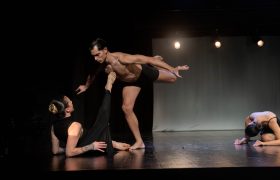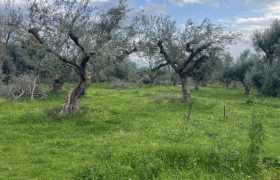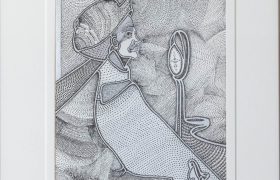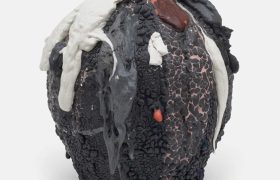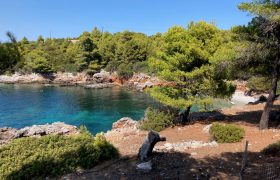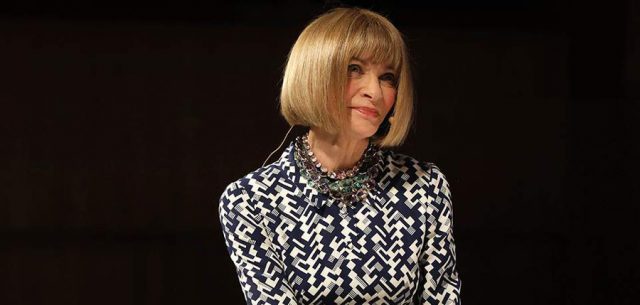An ode to Greece
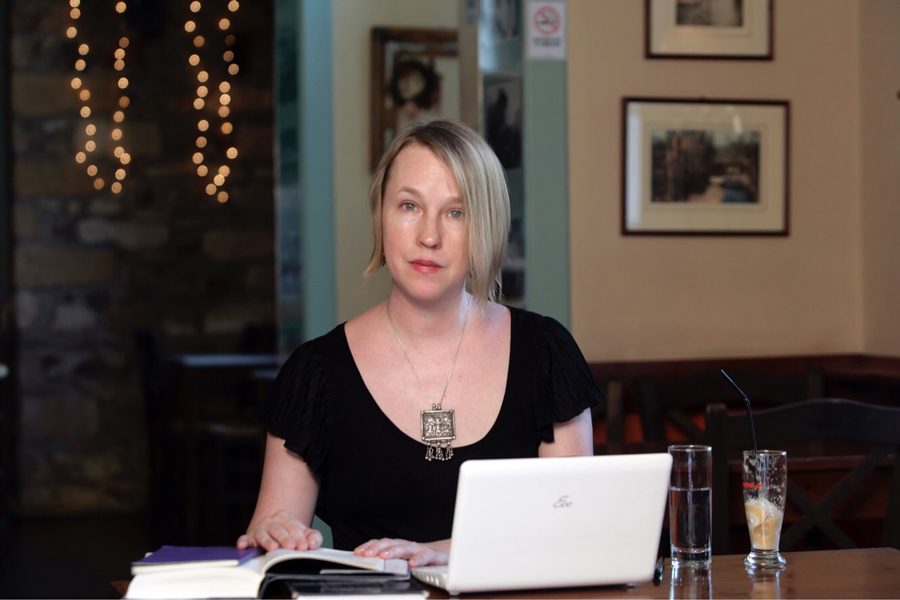
Alicia E. Stallings
Alicia E. Stallings’ name resonates within Athens’ literary community where Greek writers and poets quote her sharp and hybrid verse. Shortlisted for the Pulitzer Prize in Poetry earlier this year, Stallings has been living in Greece for 20 years, where ‘the immediacy of contemporary Athens collides with enduring reflections on motherhood, mythology, politics, and poetry.’ In Like, her latest collection from Farrar, Straus and Giroux, Stallings presents a diverse, earthy, poignant, witty collection of poems. In conversation with Karine Ancellin.
What drew you to the classics in the first place? Is it because you studied in Athens, Georgia or is Greece simply pure serendipity?
Well, I started taking some Latin classes out of curiosity and realized that a lot of our English literature had references to older literatures. I eventually got into Greek, though I think it is my interest in poetry that brought me to the classics, and I very much enjoyed how classic classes taught classical poetry – it was not theoretical, it was practical – about scansion and word choice and I found it useful and refreshing.
You have been living in Athens since 1999, how do you see your home city?
Well it’s been a very interesting time to be in Athens. When we arrived in 1999, there was the excitement of Greece entering the Euro and the forthcoming Olympics. There was a feeling of optimism. New metro stations were being built. To go from that to the economic crisis of 2008, and afterwards the refugee situation, it’s just been an interesting and intense time in Athens. It’s never dull.
Do you consider going back to the USA?
It’s not totally off the books. I originally thought we would be here for two years but the two years became twenty years. We have children and we have built a life here. We still have friends and family in the US and I do travel there to teach at conferences and so on. We like Athens a lot and as long as we are able to stay here, I think we will try to do so.
What do you particularly enjoy in Athens?
My very favourite thing in Athens is the summer open-air movie theatres. I love seeing a movie under the Acropolis, under the night sky and the moon. It’s one of my favourite things. I also love the first cemetery of Athens – it’s an interesting place to walk around. One of the nice things about Athens is you can be somewhere else very quickly, you can go to an island or take a day trip in a short time. It feels to me like a safe city as well as an energetic one. It’s a great place to raise children, though probably not as great to be a teenager in. We have enjoyed living here.
I like the energy of Athens at this time of the year when even if you see the ugliness, there is also this beautiful scent of the bitter oranges that washes over everything else with grace.
How does your dual belonging find its way in your poetry, or do you feel it stays private and language informs the essence of your poems?
Well my life in Athens does get into the poems and my life in Greek as well as in English gets into the poems, in certain ways, not just subject matter but word choices. I do have poems about Athens. I think it’s partly the sights you see and the sounds and the metaphors that spring out of your everyday life. One of the things I realized is that you always have access to your childhood and your former life, as well as your current life, so they do seem to both be in existence in a lot of the poems.
You started in high school with a poem that was published.Was that when your calling for poetry was born?
I wanted to be a writer since grade school. I have always written poems and publishing poems in High school was a confirmation. Maybe I thought I would also write novels and so on, which didn’t happen. I think a kind of commitment to poetry in particular happened in University. I was thinking about what a poet’s life is supposed to be.
What stayed with you from your years at Lady Margaret Hall?
I wasn’t there for such a long time though it was an extremely intense period of time and I am still fairly close with some of the people I met there. My tutor Richard Jenkyns is very important to me and we are still in touch. I think partly because there were people who took me seriously as a poet even though I was quite young. It was also a time of intense immersion reading and intense immersion in classics, and being taken seriously by people I admired, which was an affirmation. Also around that time I started doing more serious translations. I was encouraged in doing so by professor Jenkyns. Translation also fed the poetry and the commitment to be a poet fed the translation; they were the same calling as it were.
You came to your translation of Lucretius On the nature of things through Virgil and your interest in The Georgics, in hindsight, was it a turning point in your work?
Getting the commission to do the whole translation of Lucretius, which is over seven thousand lines – and then you realize this is to be a project of several years – and having a contract where I guess you could say you are now a professional translator – that was certainly a turning point, and which maybe freed me up in some ways. It meant I had my professional work and translation to sit down to while I was free to do my own work as well.
You said “the ancient showed me that technique was not the enemy of urgency, but the instrument” what urgency are you referring to?
The urgency of the poem, the passion or the occasion of the poem. There has to be some reason why you feel compelled to write. There is often this idea that form or technique is somehow limiting to emotion or is somehow artificial and somehow preventing people from self-expression, and I realized it was very much a tool of all these things and could sharpen how you express yourself and how you understand how you are feeling. For me, form is about giving up some control to the muse, but, at the same time, that kind of technical precision can actually make a poem more powerful rather than less.
Are you going to stay with poetry or try your hand at other art forms, like short story or fiction?
I have written some fiction in the past and I don’t think that it is the genre for me. I do write a lot criticism and do a fair amount of non-fiction, including what I would I call ‘literary journalism’ describing things unfolding in Greece. My husband, John Psaropoulos,is a journalist, and I’m fairly used to the ideas that if something is happening on my doorstep I should be able to go and see what it is and describe it as best as I can. There is a lot more interest in that. People want to hear what things are like on the ground in Athens, so I just branched into that.
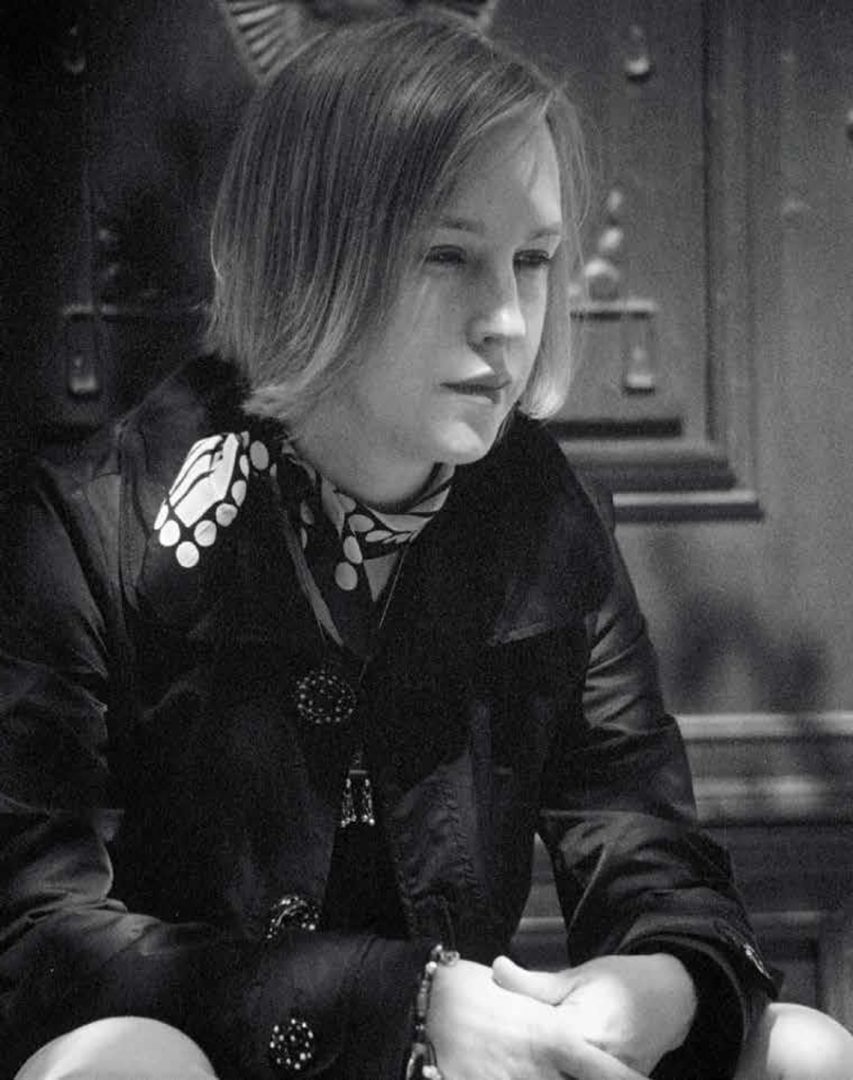
I read that you were affected by the traumatized refugee children coming to Greece and those who sometimes drown before they reach here.… what is that like today?
I’ve actually just spent the morning at a squat in the center of Athens doing activities with children. It’s very much the same. There is not that sudden emergency that was there in 2015/16 but it’s chronic. This month has actually been a very bad one for drowning in the Aegean and there are also drownings in the river Evros in the North. You see it in different kinds of problems. I do sometimes write about it, and I run a poetry workshop with refugee women at the Melissa Network, so it’s become part of my life, and that’s something unexpected.
How did you overcome the difficulty of writing about your experience with the refugees, do you still work/write about the refugees?
I haven’t written much verse on this, I’ve written mainly in prose. I’ve done a few poems like epigrams about drownings and some poems about interactions. I’m a little wary about how to approach such a topic because these are not my stories, obviously, these are things that have happened to other people. At the Melissa network I enjoy watching women write their own stories, and write in the first person. I very much enjoy facilitating this process. Again, it’s a fairly large part of my life so it eventually ends up in the poems.
One thing that has been interesting is that, as is very much the case in Greece and Greeks, people from Iran, Afghanistan, Syria and Iraq come from cultures where poetry is very highly prized and poets are regarded highly – as opposed to the Anglo-Saxon world where poets are often viewed as eccentric or odd, and poetry is almost an embarrassment.
Shoulda, Woulda, Coulda is a sonnet, why this pleasure to embed your contemporary verse within classic structures?
The sonnet is such a tough flexible little engine. I do write a fair number of sonnets. It’s a wonderful infinite form, it’s about the length of certain kinds of thoughts. One of the things I like about the sonnet is that there is an argument in it, you put forth something in 8 lines and then you have to twist it and come up with something against that in 6 lines, so I think it’s an infinite rewarding form. There is no reason why it should not be contemporary simply because it’s been around a long time. Often what makes something contemporary is not the structure or the form which I would say is almost a platonic eternal kind of form but a matter of using contemporary language, diction and situations. The content and the speech pattern of a poem is often what makes it contemporary rather than the form itself. There is nothing inherently old-fashioned about a sonnet.
Do you endorse your association with New Formalism as a poet?
I don’t like the term ‘New Formalism’ but I think nobody likes that term. I think partly it’s that “ism” which sounds as if it has an agenda, an axe to grind, or some sort political thing. The ‘New’ is also problematic because there is nothing new really about what I do I feel very much that I am part of a tradition. But in terms of certain aspects of New Formalism, the West Chester Poetry Conference, Poetry by the Sea Conference, the fellowship of other writers who work in form and rhyme, I am happy to be in that group, even though I would not call myself a New Formalist – and almost no one who is in New Formalism would call themselves that. There was a sort of poetry battle as it were in the nineties and early two-thousands where there seemed to be more tension between people who worked in rhyme and form people who worked with free verse – at least in America. I don’t think there is that much of an issue in the rest of the English-speaking world. I think it was largely a false dichotomy and it is very rare now to see a journal say we will not look at rhyme in poetry. I think people have realized that as long as the poetry is good, it doesn’t matter whether it rhymes or not. I think that distinction means less than it used to, or I hope so. I hope poems are taken more on their own merit or lack thereof rather than on a superficial aspect such as whether they rhyme or not.
Do you write as a woman?
Well I don’t think I have much choice about that! We all write from a perspective that we have, and certainly a lot of my poems are from the position of being a woman. I often take voices of women from the past or write about motherhood or marital spats and it seems quite natural for me to largely take the female viewpoint there. Sonnets have always been gendered, and people tend to enter the sonnet from a gendered perspective and that’s actually part of its tradition. There are some of my poems where it would not be obvious that the writer is a woman and others where that would be the assumption. There are people who contact me, since I publish under my initials, who have assumed I am a man. That somewhat bemuses me because, considering the subject matter, that would not be my obvious conclusion. We have to write from who we are.
One thing I have enjoyed about translation is being someone else, such as being a man from long ago. I certainly think you can write from any position your imagination is able to encompass.
Have your previous prizes from the Wilbur Award, the Guggenheim Foundation fellowship and the MacArthur Foundation prizes rooted your words in a specific direction?
Prizes are a complicated issue. One of the poets I translated, an eight century BC Greek poet, Hesiod, makes a big deal about a prize he won, so the idea of competition has always been around. All of the Greek plays, for instance, were produced in the context of competitions, so it’s a confirmation to get a prize, especially for a young poet. It’s obviously exciting to get a prize, it makes you feel that people are appreciating your work; it can energize you to go forward. Nonetheless it can also cause doubts. Certainly for prizes that come with money, there is a practical element as it gives you more time. In my case it was buying childcare. For the MacArthur and Guggenheim prizes, it came at a critical point for us as we weren’t sure we could stay here during the financial crisis. The newspaper my husband was editing went under so it was one of the prizes that gave us the courage to stick it out. We knew we would be able pay our bills and one of the first things I did was to rent an office. You cannot disregard the practical element to the prize that comes with the psychological element. It’s the financial support that is really important. I’ve been lucky and my prizes have come at critical moments.
And now what does it feel to be shortlisted for the Pulitzer Prize?
Very much of a surprise! I didn’t realize it was going to be announced and I had no idea my book had even been shortlisted. My publisher was excited, and it certainly gives the book a boost of attention. It’s very gratifying.
Who are the ancients that speak to you?
Hesiod and Lucretius, the poets I translated.Lucretius is very important to me, Virgil, The Georgics is very important to me. Probably the ancient poem I have spend the most time reading or thinking about is Homer’s Odyssey, which I think is sort of infinite and speaks to everybody.
Any poet you spend a long time with does end up speaking to you although you also choose them because you share some sort of chemistry.
And Contemporary Poets?
Some recently deceased poets I admire include Richard Wilbur and Seamus Heaney. Wonderful poets working right now in the US include Rhina Espaillat, Josh Mehigan, Ernie Hilbert, Ange Mlinko, Paisley Rekdal, and Catherine Tufariello.
What about poets in Greece?
This is always hard off the top of the head—you know you will end up leaving lots of people out. I am certainly a fan of Katerina Anghelaki Rooke, and Kiki Dimoula, and poets closer to my age such as Katerina Iliopoulou, Stamatis Polenakis, Panayotis Ioannidis. And of course older poets such as (especially) Cavafy, Seferis, and Sikelianos.
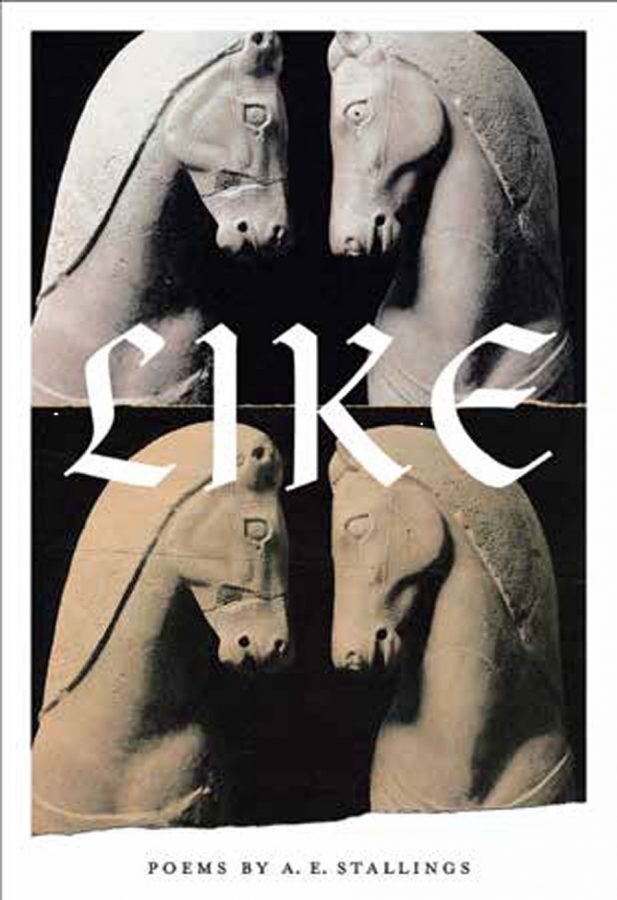
Like, by A. E. Stallings
Like, that currency of social media, is a little word with infinite potential; it can be nearly any part of speech. Without it, there is no simile, that engine of the lyric poem, the lyre’s note in the epic. A poem can hardly exist otherwise. In this new collection, her most ambitious to date, A. E. Stallings continues her archeology of the domestic, her odyssey through myth and motherhood in received and invented forms, from sonnets to syllabics. Stallings also eschews the poetry volume’s conventional sections for the arbitrary order of the alphabet. Contemporary Athens itself, a place never dull during the economic and migration crises of recent years, shakes off the dust of history and emerges as a vibrant character. Known for her wry and musical lyric poems, Stallings here explores her themes in greater depth, including the bravura performance Lost and Found, a meditation in ottava rima on a parent’s sublunary dance with daily-ness and time, set in the moon’s Valley of Lost Things.
Like, by A. E. Stallings (Farrar, Straus and Giroux)
Karine Ancellin is founding member and Director of A Poets’Agora, a bilingual poetry society here in Athens.

